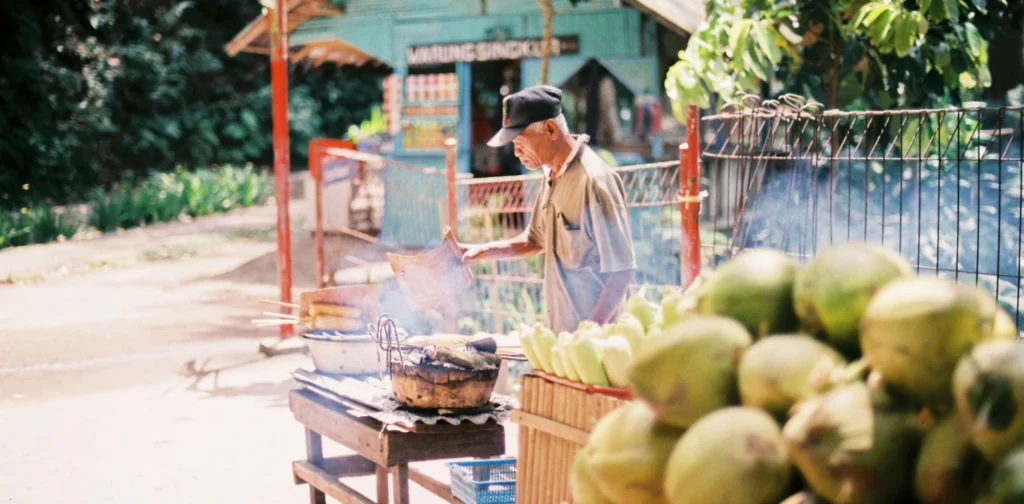Integrating Sustainability in Indonesia’s Gastrodiplomacy Efforts

Photo: Helene Nguyen on Unsplash.
As one of basic human needs, food can become a medium to create a nation’s political branding. The practice of using cuisine to increase soft power is called gastrodiplomacy. In recent years, Indonesia has been aiming to strengthen its gastrodiplomacy. Amidst domestic issues and global uncertainties, ensuring Indonesia’s gastrodiplomacy efforts go beyond the superficial is a necessary challenge.
Benefits of Gastrodiplomacy
According to the United Nations World Tourism Organization (UNWTO), gastronomy tourism provides stimulating benefits for the local economy. Research shows that tourists spend approximately 40% of their budgets on food. To them, consuming traditional local food is a part of the cultural experience they seek in their travels. Promoted and managed well, this tendency bolsters the local vendors and enhances the preservation of culture and environmentally conscious traditions.
Besides tourism, a strong culinary identity at the global stage can drive the export of Indonesian commodities as ingredients and food products. This boost should encourage more domestic food production, create job opportunities, and drive innovation.
Indonesia’s Gastrodiplomacy Efforts
Indonesia began its culinary diplomacy efforts through small, scattered projects. To start, Indonesia started incorporating Indonesian dishes into the Ministry of Foreign Affairs’s cultural events and Indonesian food festivals.
In 2018, the Ministry of Tourism launched the Wonderful Indonesia Co-branding program. They invited Indonesian restaurants abroad to promote Wonderful Indonesia Tourism. In turn, the restaurants would get promotion via the Ministry of Tourism’s social media and a networking opportunity. The country then turned to its rich spices in 2021. Indonesia Spice Up the World (ISUW) was established as one of Indonesia’s strategies to mend its economic conditions postpandemic.
The Indonesian government also sought out external partnerships. Indonesia partnered with the UNWTO to launch the Gastronomy Tourism Project in Ubud, Bali. Concluded in 2023, it aimed to boost the local economy, preserve gastronomic heritage, and create job fields for sustainable development.
Challenges and Sustainable Way Forward
Equipped with rich cultural diversity as well as biodiversity, Indonesia’s gastrodiplomacy potential is promising. It offers a variety of options, from meat satays to naturally plant-based traditional foods like pecel and orek tempeh. Indonesia’s culinary adventures also differ from one city to the next.
Yet, the country is still significantly behind others, including its neighbor Thailand. There were only around 2,000 Indonesian restaurants abroad in 2024 compared to Thailand’s 17,478 in 2023. This is primarily due to the lack of export system support from Indonesia, which influences the fluctuating prices and availability of Indonesian ingredients. In contrast, the Thai government formed the Thai Export Promotion Division to enact standardization and policies related to Thai cuisines.
Besides creating policies that support the export and financing aspects, Indonesia must be ready to address the domestic impacts of its gastrodiplomacy. For instance, food production must fulfill the needs of the Indonesian people as well as the foreign appetite. Meanwhile, the success of Indonesia’s gastronomy tourism contributes to high levels of food waste, underscoring the urgency of proper waste management.
Gastrodiplomacy for Sustainable Development
Ultimately, gastrodiplomacy efforts must go hand-in-hand with a framework that enables sustainable food systems, MSME growth, and cultural preservation. It should also ensure the wellbeing of the environment, Indigenous Peoples, and local communities. After all, healthy, far-reaching branches can only come from strong, resilient roots.


 Strengthening Resilience amid Growing Dependence on Space Infrastructure
Strengthening Resilience amid Growing Dependence on Space Infrastructure  Indian Gig Workers Push Back Against 10-Minute Delivery Service Strain
Indian Gig Workers Push Back Against 10-Minute Delivery Service Strain  Call for Governance: Grassroots Initiatives Look to Scale Efforts to Conserve Depleting Groundwater
Call for Governance: Grassroots Initiatives Look to Scale Efforts to Conserve Depleting Groundwater  Integrating Environment, Climate Change, and Sustainability Issues into Education Systems
Integrating Environment, Climate Change, and Sustainability Issues into Education Systems  Finally Enforced: Understanding the UN High Seas Treaty
Finally Enforced: Understanding the UN High Seas Treaty  Risks and Opportunities of Submarine Communication Cables for Sustainable Development
Risks and Opportunities of Submarine Communication Cables for Sustainable Development